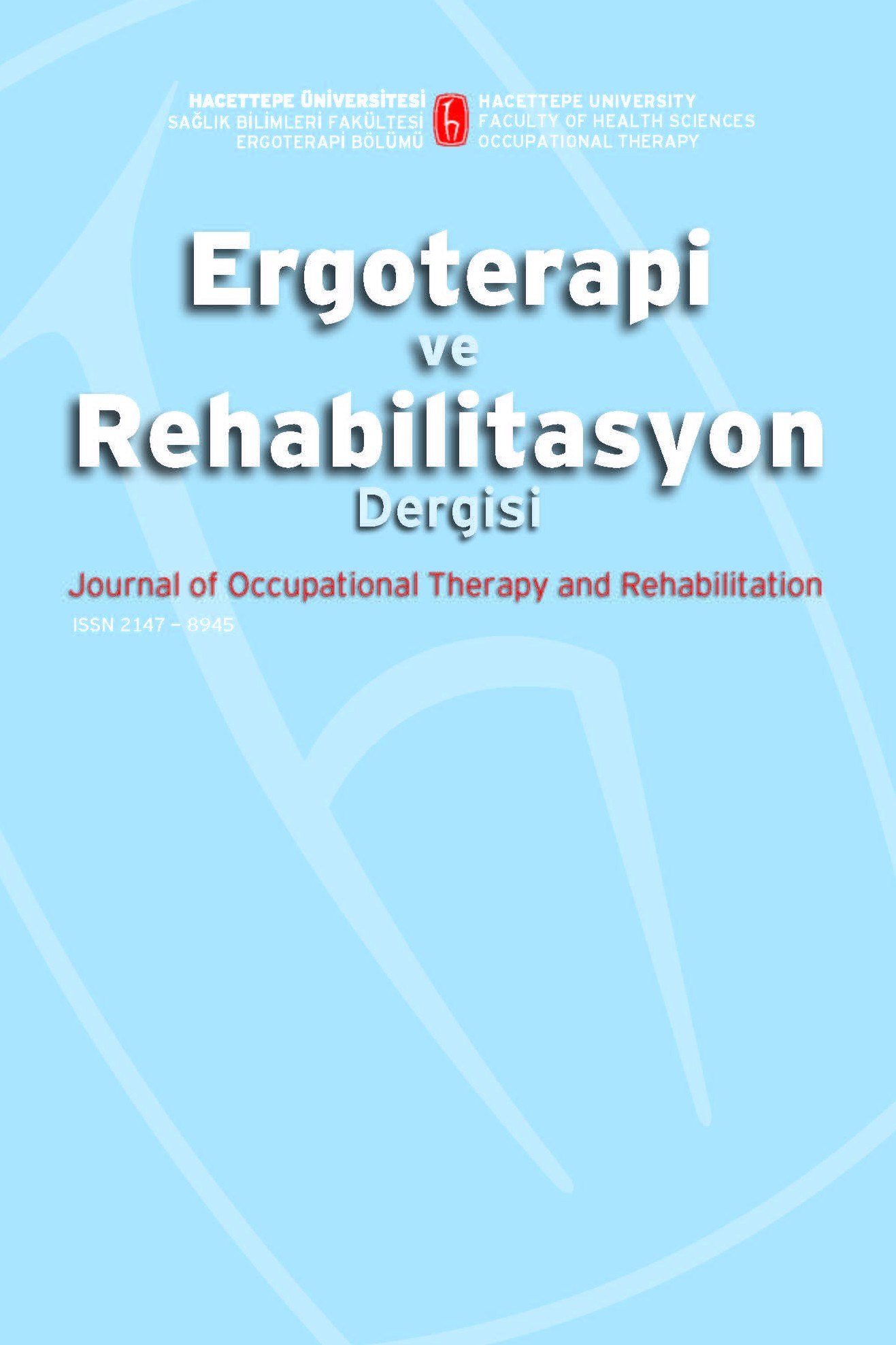Investigation of Factors Affecting Neuromotor Behavior in Premature Neonates
Nöromotor Davranış, Prematürite, Ağrı, Konfor, Apgar Skoru
Investigation of Factors Affecting Neuromotor Behavior in Premature Neonates
Neuromotor Behavior, Prematurity, Pain, Comfort, Apgar Score,
___
- Ambuel, B., Hamlett, K.W., Marx, C.M., Blimer, J.L. (1992). Assessing distress in pediatric intensive care environments: The COMFORT Scale. Journal of Pediatric Psychology, 17, 95-109.
- Can, G. & İnce, Z. (2002). Preterm doğanlar, intrauterin büyüme geriliği, makrozomi, çoğul gebelik. Neyzi O, Ertuğrul T (Editors). Pediatri 1. Nobel Tıp Kitapevi; 326-342, İstanbul.
- Carmichael, K., Burns, Y., Gray, P., O'Callaghan, M. (1997). Neuromotor behavioural assessment of preterm infants at risk for impaired development. Aust J Physiother, 43(2), 101-107.
- Dağoğlu, T., Yurdakök, M., Erdem, G. (Editors) (2004). Neonatoloji’de Prematürite, 123-129, Güneş Tıp Kitapevi, Ankara.
- Francis, D,. Diorio, J., LaPlante, P., Weaver, S., Seckl, J.R., Meaney, M.J. (1996). The role of early environmental events in regulating neuroendocrine development. Moms, pups, stress, and glucocorticoid receptors. Ann N Y Acad Sci, 794, 136–152.
- Graignic-Philippea, R., Dayan, J., Chokronb, S., Jacquetb, A.Y., Tordjmana, S. (2014). Effects of prenatal stress on fetal and child development: A critical literature review. Neuroscience and Biobehavioral Reviews, 43, 137–162.
- Gunnar, M.R. (1998). Quality of early care and buffering of neuroendocrine stress reactions: potential effects on the developing human brain. Prev Med, 27(2), 208–211.
- Hack, M., Wilson-Costello, D., Friedman, H., Taylor, G.H., Schluchter, M., Fanaroff, A.A. (2000). Neurodevelopment and predictors of outcomes of children with birth weights of less than 1000 g. Arch Pediatr Adolesc Med, 154, 725-731.
- Hindmarsh, G.J., O’Callaghan, M.J., Mohay, H.A., Rogers, Y.M. (2000). Gender differences in cognitive abilities at 2 year in ELBW infants. Early Hum Dev, 60, 115-122.
- Hoekstra, R.E., Ferrara, B., Couser, R.J., Payne, N.R., Connett, J.E. (2004). Survival and long-term neurodevelopmental outcome of extremely premature infants born at 2326 weeks’ gestational age at a tertiary center. Pediatrics, 113, e1-6.
- Lawrence, J., Alcock, D., McGrath, P., Kay, J., MacMurray, S.B., Dulberg, C. (1993). The development of a tool to assess neonatal pain. Neonatal Network 12(6), 59–66.
- Monique, A.A., Caljouw-Marguerite, A.C., Kloos-Madeleine, Y., Olivier-Ida, W., Heemskerk-Winke, C.R., Pison-Gerben, D., et al. (2007). Verhoef measurement of pain in premature infants with a gestational age between 28 to 37 weeks: Validation of the adapted COMFORT Scale. Journal of Neonatal Nursing, 13, 13-18.
- Msall, M.E., Buck, G.M., Rogers, B.T., Duffy, L.C., Mallen, S.R., Catanzaro, N.L. (1993). Predictors of mortality, morbidity, and disability in a cohort of infants < or = 28 weeks' gestation. Clin Pediatr, 32, 521-527.
- Nelson, K.B. & Ellenberg, J.H. (1981). Apgar scores as predictors of chronic neurologic disability. Pediatrics, 68, 36–44.
- Noble, Y. & Boyd, R. (2012). Neonatal assessments for the preterm infant up to 4 months corrected age: a systematic review. Dev Med Child Neurol, 54(2), 129-139.
- Schneider, M.L. (1992). Delayed object permanence development in prenatally stressed rhesus monkey infants (Macaca mulatta). Occup Ther J Res, 12, 96–110.
- Schneider, M.L. & Coe, C.L. (1993). Repeated social stress during pregnancy impairs neuromotor development of the primate infant. J Dev Behav Pediatr, 14(2), 81–87.
- The Apgar Score (2015). Committee Opinion No 644. American College of Obstetricians and Gynecologists. Obstet and Gynecol; 126(4), 52-55.
- Van den Bergh, B.R., Mulder, E.J., Mennes, M., Glover, V. (2005). Antenatal maternal anxiety and stress and the neurobehavioural development of the fetus and child: links and possible mechanisms. A review. Neuroscience and Biobehavioral Reviews, 29, 237–258.
- Vohr, B.R., Wright, L.L., Dusick, A.M., Mele, L., Verter, J., Steichen, J.J., et al. (2004). Neurodevelopmental and functional outcomes of extremely low birth weight infants in the National Institute of Child Health and Human Developmental Neonatal Research Network, 1993-1994. Pediatrics, 105, 1216-1226.
- Wood, N.S., Costeloe, K., Gibson, A.T., Hennessy, E.M., Marlow, N., Wilkinson, A.R. (2005). The EPICure study: associations and antecedents of neurological and developmental disability at 30 months of age following extremely preterm birth. Arch Dis Child Fetal Neonatal Ed, 90, F134-140.
- Wood, N.S., Marlow, N., Costeloe, K., Gibson, A.T., Wilkinson, A.R., for the EPICure Study Group. (2000). Neurologic and developmental disability after extremely preterm birth. EPICure Study Group. N Eng J Med, 343, 378-384.
- Woodward, L.J., Anderson, P.J., Austin, N.C., Howard, K., Inder, T.E. (2006). Neonatal MRI to predict neurodevelopmental outcomes in preterm infants. New England Journal of Medicine, 355(7), 685-694.
- ISSN: 2147-8945
- Yayın Aralığı: Yılda 3 Sayı
- Başlangıç: 2013
- Yayıncı: Hacettepe Üniversitesi Sağlık Bilimleri Fakültesi
Berkan TORPİL, Onur ALTUNTAŞ, Mine UYANIK
Investigation of Factors Affecting Neuromotor Behavior in Premature Neonates
Erdoğan KAVLAK, Fatih TEKİN, Mustafa BURAK
Özge DEMİREL, Şeyda TOPRAK ÇELENAY
Is It Really Accessibility: A Qualitative Study About School Accessibility
Gonca BUMİN, Sinem KARS, Meral HURİ, Hülya KAYIHAN
Merve BATUK, Songül AKSOY, Hülya KAYIHAN, Levent SENNAROĞLU
ACTIVLIM Ölçeği’nin Rasch Analizi ile Nöromusküler Hastalıklarda Türkçe Adaptasyonu
Muhammed KILINÇ, Derya GÖKMEN, Cevher DEMİRCİ, İpek GÜRBÜZ, Öznur TUNCA YILMAZ, Sibel AKSU YILDIRIM, Çiğdem ÖKSÜZ, Hatice ABAOĞLU
Ruhsal Bozukluklarda Gevşeme Eğitiminin Ağrı, Yorgunluk Ve Uyku Üzerine Etkisinin İncelenmesi
Gamze EKİCİ, Zeynep KOLİT, A. Elif ANIL YAĞCIOĞLU
Gerçekten Erişilebilir Mi? Okul Erişilebilirliği Hakkında Nitel Bir Çalışma
